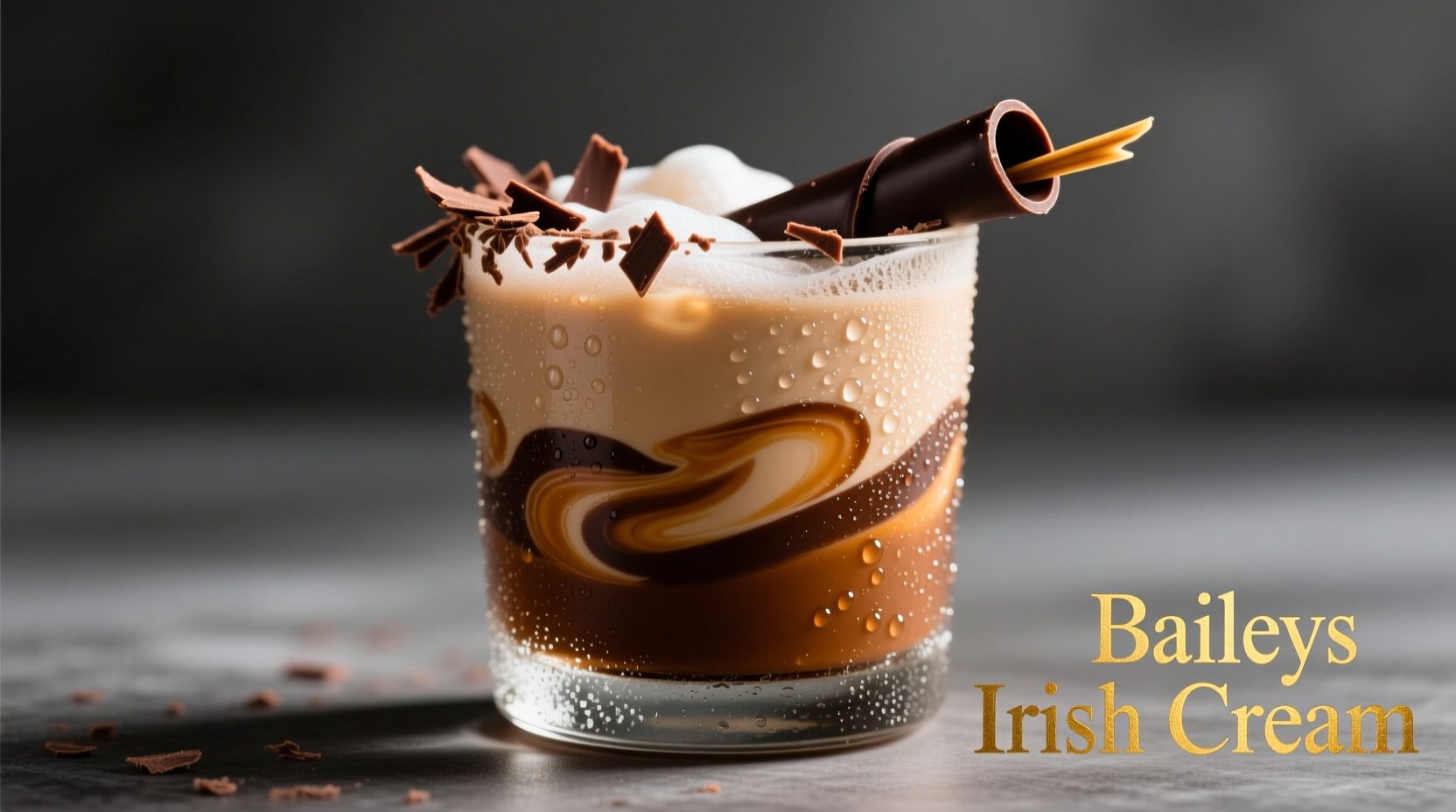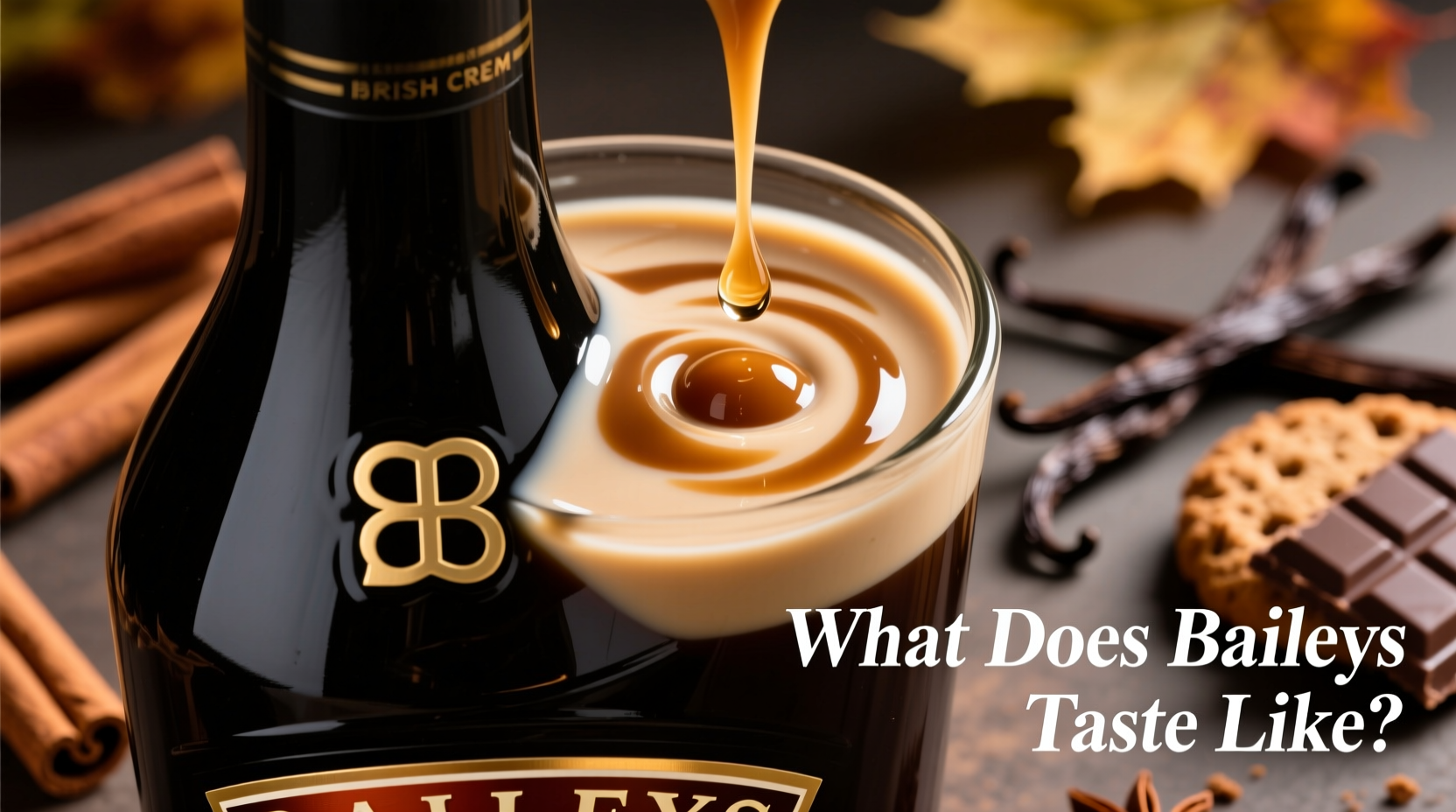When you take your first sip of Baileys Irish Cream, you're greeted with an immediate impression of fresh dairy cream that coats your palate. This signature creaminess forms the foundation of Baileys' distinctive flavor profile, creating a luxurious mouthfeel that sets it apart from other liqueurs. The creaminess isn't heavy or cloying—it's remarkably smooth and well-integrated with the other flavor components.
Your First Encounter with Baileys
Understanding what to expect when tasting Baileys for the first time helps set appropriate expectations. Unlike clear spirits that deliver an immediate alcohol punch, Baileys presents itself as a dessert-like beverage with its opaque, milk chocolate appearance. When poured over ice, it maintains its creamy consistency while slightly chilling the palate.
The initial aroma offers subtle hints of coffee and chocolate before the liquid even touches your lips. As you take that first sip, three distinct flavor layers become apparent in sequence: the creamy base, the coffee-chocolate middle notes, and the gentle whiskey warmth that follows.

Breaking Down the Flavor Profile
Baileys achieves its signature taste through a carefully balanced formula that includes Irish whiskey, fresh dairy cream, cocoa, and arabica coffee. According to the official Baileys production process documented on their website, they use only fresh cream that's delivered to the distillery within 48 hours of milking, which contributes significantly to the authentic dairy flavor that artificial creamers can't replicate (Baileys Official Site).
The coffee element isn't overpowering—it's a mild, roasted coffee note that complements rather than dominates. Similarly, the chocolate flavor comes through as a subtle cocoa presence rather than a sweet chocolate candy taste. The Irish whiskey provides structure and depth without the sharp alcohol burn found in straight spirits.
| Flavor Component | Intensity | Contribution to Overall Taste |
|---|---|---|
| Fresh Dairy Cream | High | Creates smooth texture and rich mouthfeel |
| Irish Whiskey | Moderate | Provides warmth and complexity without harshness |
| Arabica Coffee | Moderate | Offers roasted notes that balance sweetness |
| Cocoa | Mild | Adds depth and complements coffee notes |
| Vanilla | Subtle | Enhances sweetness and rounds out flavor profile |
How Temperature Affects Baileys' Flavor
Temperature significantly impacts how Baileys tastes. Food science research from the Journal of Sensory Studies indicates that cooling creamy beverages reduces perceived sweetness while enhancing texture perception (Journal of Sensory Studies). This explains why many prefer Baileys chilled or over ice—it creates a more balanced flavor experience where the creaminess becomes more pronounced while the sweetness appears more moderate.
When served warm, perhaps in coffee, the whiskey notes become more prominent and the sweetness intensifies. The cream separates slightly when heated, creating a different textural experience that some prefer for cold-weather consumption.
Baileys Compared to Similar Cream Liqueurs
Understanding what makes Baileys unique requires comparing it to similar products. While many cream liqueurs exist, Baileys maintains a distinctive profile:
- Kahlúa Cream: Sweeter with stronger coffee flavor and less prominent creaminess
- Cadbury Creme de Cacao: More chocolate-forward with less whiskey presence
- Carolans Irish Cream: Slightly lighter body with more pronounced butterscotch notes
- Morgans Irish Cream: Thicker texture with stronger whiskey presence
The unique balance in Baileys—neither too sweet nor too alcoholic—has contributed to its position as the world's best-selling Irish cream liqueur for decades. Consumer taste tests documented by the International Wine and Spirits Competition consistently show Baileys scoring highest for balanced flavor profile among cream liqueurs (International Wine and Spirits Competition).
Common Misconceptions About Baileys' Taste
Several myths persist about what Baileys actually tastes like:
- "It tastes strongly of alcohol" - The whiskey is present but well-integrated, not overpowering
- "It's just like chocolate milk" - While there are cocoa notes, the coffee and whiskey elements create complexity beyond simple chocolate
- "It's too sweet to drink straight" - When properly chilled, the sweetness is well-balanced and enjoyable neat
- "All Irish creams taste the same" - Different brands use varying cream sources and spirit bases that significantly impact flavor
Best Ways to Experience Baileys' Flavor
To fully appreciate what Baileys tastes like, consider these serving methods:
- Chilled neat - Refrigerate the bottle and serve in a small glass to experience the pure flavor profile
- Over premium ice - Slows consumption and slightly dilutes, revealing different flavor notes
- In coffee - The heat opens up the whiskey notes while the coffee complements existing flavors
- With chocolate desserts - The flavors harmonize beautifully with chocolate-based sweets
Professional tasters recommend letting Baileys sit on your palate for 10-15 seconds before swallowing to experience the complete flavor evolution—from initial creaminess through the coffee-chocolate middle notes to the whiskey finish.
Storage Tips to Maintain Flavor Quality
Unlike many spirits, Baileys contains dairy and requires proper storage to maintain its intended flavor profile. The dairy components can separate or spoil if not handled correctly. Always store opened bottles in the refrigerator and consume within 18 months for optimal taste. Avoid freezing, as this can alter the delicate emulsion that creates Baileys' signature smooth texture.
Frequently Asked Questions
Does Baileys taste strongly of whiskey?
Baileys contains Irish whiskey but the alcohol presence is subtle and well-integrated. You'll notice a gentle warmth rather than a strong whiskey flavor, making it approachable even for those who don't typically enjoy straight spirits.
Is Baileys as sweet as it looks?
While Baileys is sweet, it's not cloyingly so. The sweetness is balanced by coffee notes and the slight bitterness of cocoa, creating a dessert-like profile that's rich but not overwhelming, especially when served chilled.
How does Baileys compare to coffee liqueur?
Baileys has a creamier texture and more balanced flavor than traditional coffee liqueurs like Kahlúa. While coffee liqueurs are primarily sweetened coffee flavors with higher alcohol content, Baileys offers a complex blend of cream, coffee, chocolate, and whiskey in a smoother package.
Does Baileys taste different when mixed in cocktails?
Yes, mixing Baileys changes its flavor profile. In cold cocktails, the creaminess becomes more pronounced while the sweetness appears more moderate. When heated (as in Irish coffee), the whiskey notes become more prominent and the overall flavor intensifies.
Why does my Baileys taste different than before?
Baileys' flavor can change if not stored properly. Since it contains dairy, it must be refrigerated after opening. Exposure to heat, light, or air can cause separation or flavor degradation. An unrefrigerated bottle past its prime may develop a sour taste as the dairy components spoil.











 浙公网安备
33010002000092号
浙公网安备
33010002000092号 浙B2-20120091-4
浙B2-20120091-4